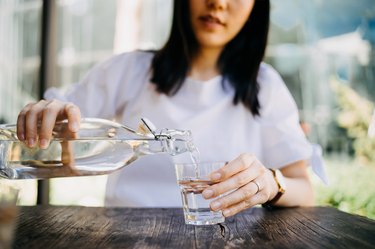
Constipation is one of the most common health complaints, affecting millions of people worldwide. Many times, it's accompanied by bloating, stomach cramps, gas and digestive discomfort. If you experience this problem after drinking water, your diet or an underlying disorder might be the culprit.
Tip
Drinking a lot of water is unlikely to cause constipation. If you experience this symptom despite staying hydrated, consider changing your diet and lifestyle habits.
Video of the Day
Water Intake and Constipation
About 16 percent of adults experience constipation, according to a May 2018 review in the journal Medicine. This condition is even more common in older adults, affecting one-third of seniors. Women are at higher risk than men, especially during pregnancy when their hormones fluctuate and gut motility slows down.
Video of the Day
Constipation can have a variety of causes, from bad eating and lack of exercise to digestive disorders. In general, it's diagnosed in those who have fewer than three bowel movements per week, points out Johns Hopkins Medicine. Certain medications, laxative abuse, low fiber intake and even stress contribute to this digestive condition.
A common cause of hard, dry stools is dehydration. Water and fluids, in general, help move food through your gut and stimulate bowel movements. If you don't drink enough water, you may experience sluggish digestion. A diet low in fiber only makes things worse. Lifestyle changes and natural remedies, such as increasing your fiber and fluid intake, may help prevent and relieve constipation.
Excess water consumption is unlikely to cause these issues. Dehydration, not overhydration, is often to blame for constipation. The Canadian Society of Intestinal Research and other health organizations recommend maintaining an adequate fluid intake to prevent this condition in the first place.
What Causes Constipation?
Constipation is not a disease, but a symptom, points out the National Institute on Aging. If you drink enough water but still experience this issue, reach out to your doctor. You may have an underlying disorder, such as gastroparesis or IBS (irritable bowel syndrome). Certain diseases, such as hypothyroidism, diabetes and colon cancer, may cause constipation, too.
Gastroparesis, for example, affects gut motility, paralyzing the muscles that help break down and move food in the digestive tract. According to a recent study published in the Journal of Neurogastroenterology and Motility in April 2019, there's a strong link between this motility disorder and slow-transit constipation. These people may also experience heartburn, bloating, vomiting, nutrient deficiencies and unintentional weight loss.
Another underlying cause of constipation is IBS. While some individuals experience diarrhea, others struggle with constipation, bloating and tummy pain. Doctors typically recommend dietary changes, regular exercise and adequate sleep for IBS with Constipation (IBS-C). Simple things, such as limiting caffeine and alcohol, cutting out gluten and filling up on fiber, can make all the difference.
How to Relieve Constipation Fast
Unless you have a serious condition such as bowel obstruction you should be able to relieve constipation through lifestyle changes.
Start by drinking more water to stay hydrated and keep your digestive system running smoothly. Carbonated water appears to be more effective for constipation relief than plain water, according to a January 2014 report featured in Cochrane Database of Systematic Reviews. Abdominal massage may help, too.
The Mayo Clinic recommends adding more fiber to your diet as you increase your fluid intake. Fresh fruits, leafy greens, legumes, whole grains, oat and wheat bran, chia seeds, nuts and cruciferous veggies are all healthy choices. One serving of raspberries (one cup), for instance, provides about 8 grams of fiber, reports Mayo. A single cup of chopped broccoli (cooked) offers 5 grams of this nutrient. Ideally, aim for 25 to 30 grams of fiber per day.
Choose foods that are high in fiber and water. This combo supports digestive health and may help with constipation. Plus, it makes it easier to increase your fluid intake without drinking tons of water. Fresh fruits and vegetables fall into this category. Strawberries, for example, are over 90 percent water and deliver around 3 grams of fiber per serving (one cup).
Warning
Beware that eating too much fiber can worsen bloating and constipation. Try not to exceed 70 grams per day.
Another option is to add psyllium husk or wheat bran to a glass of water and drink this mixture in the morning or anytime throughout the day. Psyllium husk is a type of dietary fiber that absorbs water in the digestive tract and softens the stool, which in turn, may help relieve constipation.
Alternatively, mix one cup of prune juice, one cup of oat bran and one cup of applesauce in a medium bowl. Take one or two tablespoons (but no more than four) each evening to stimulate bowel movements, recommends the Johns Hopkins Women's Center for Pelvic Health. If you don't notice any improvements within two weeks or so, contact your doctor.
- Medicine: "Chronic Constipation"
- Johns Hopkins Medicine: "Constipation"
- NCBI: "Does Stress Induce Bowel Dysfunction?"
- Canadian Society of Intestinal Research: "Constipation Overview"
- National Institute on Aging: "Concerned About Constipation?"
- American College of Gastroenterology: "Gastroparesis"
- JNM Journal: "High Prevalence of Slow Transit Constipation in Patients With Gastroparesis"
- ASGE: "Understanding Irritable Bowel Syndrome With Constipation (IBS-C)"
- Harvard.edu: "Bowel Obstruction"
- Cochrane Database of Systematic Reviews: "Management of Faecal Incontinence and Constipation in Adults With Central Neurological Diseases"
- Mayo Clinic: "Chart of High-Fiber Foods"
- UCSF Health: "Increasing Fiber Intake"
- USDA: "Strawberries"
- NCBI: "Fiber Supplements and Clinically Proven Health Benefits: How to Recognize and Recommend an Effective Fiber Therapy"
- Johns Hopkins Medicine: "Bowel Regularity"